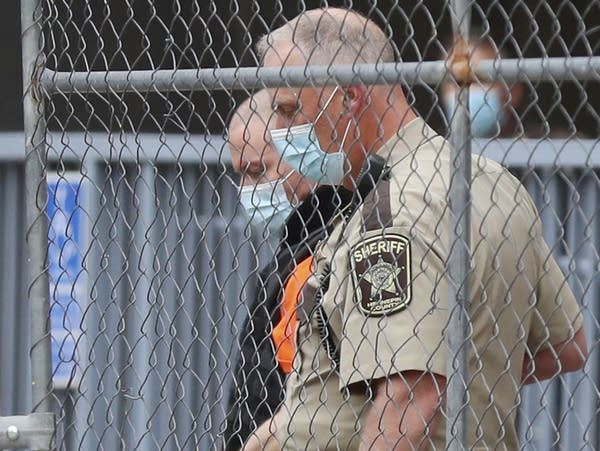Chauvin to be tried separately in Floyd case

Go Deeper.
Create an account or log in to save stories.
Like this?
Thanks for liking this story! We have added it to a list of your favorite stories.
Updated: 3:51 a.m.
The judge overseeing the trial of four former police officers charged in the killing of George Floyd has ruled that Derek Chauvin will be tried months before the three other officers are scheduled to go on trial.
The separate trials are necessary due to COVID-19 restrictions, Hennepin County District Court Judge Peter Cahill said in an order filed early Tuesday.
Chauvin, who was captured on video kneeling on Floyd’s neck for about nine minutes, will go on trial on charges of second-degree murder and second-degree manslaughter in March. Jury selection will begin March 8, and opening statements will begin no earlier than March 29, Cahill ruled.
Former officers Tou Thao, J. Alexander Kueng and Thomas Lane are charged with aiding and abetting murder and manslaughter. Their separate trial is now scheduled for Aug. 23.
Turn Up Your Support
MPR News helps you turn down the noise and build shared understanding. Turn up your support for this public resource and keep trusted journalism accessible to all.
Cahill had previously ruled that all four defendants should stand trial together. But defense attorneys told Hennepin County Chief Judge Toddrick Barnette last week that they were expecting to seat an additional legal adviser at their tables during trial.
Cahill said in his order that the physical limitations of the largest courtroom in Hennepin County Government Center “make it impossible to comply with COVID-19 physical restrictions in a joint trial.”
Prosecutors had asked the judge to push the trial back due to COVID-19. Some defense attorneys opposed the delay at a hearing last week.
In a statement, Attorney General Keith Ellison said he disagrees with the judge’s decision and believes all four defendants should be tried together.
“The evidence against each defendant is similar and multiple trials may retraumatize eyewitnesses and family members and unnecessarily burden the State and the Court while also running the risk of prejudicing subsequent jury pools,” Ellison said.
COVID-19 will still be a serious public health threat when Chauvin is scheduled to go on trial, Ellison said.
"While we are confident that the Court has established protocols to reduce the risk of COVID-19 transmission during trial, we believe, and independent public health experts agree, that with the advent of the vaccine the threat will be significantly abated by mid-year for everyone participating in or with an interest in this case,” Ellison said.
St. Paul defense attorney Paul Applebaum, who is not involved in the case, said another factor the judge could have weighed in his decision to hold two separate trials was that the other defendants may not want Chauvin’s record of misconduct held against them by jurors.
“The other obvious reason would be that the co-defendants are going to blame Mr. Chauvin, they're going to point the finger at him,” Applebaum said. “So they’d have what's called mutually inconsistent or antagonistic defenses.”
The verdict of Chauvin’s trial also could potentially impact the other three officers five months later, he said.
“I think you would have a very strong argument that your client who was accused of aiding and abetting must be acquitted because it didn't prove the underlying murder or manslaughter,” Applebaum said.
Cahill also ruled Tuesday that prosecutors did not delay in promptly turning over evidence to defense attorneys, which Chauvin’s attorney Eric Nelson had argued in asking the judge to delay his trial.
Floyd was killed on May 25 in south Minneapolis, sparking widespread protests and civil unrest.


